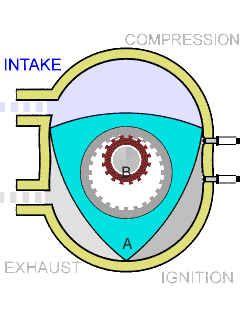
Posted on 04/29/2016 10:51:22 AM PDT by DJ Taylor
Aquarius’s new take on internal combustion engines will be the big leap forward that vehicles need, says company founder.
The notoriously conservative car business – autos, after all, are still largely powered by the internal combustion engine, developed nearly 150 years ago – is in for big changes, according to Gal Fridman, chief marketing officer and co-founder of Aquarius Engines.
“Our enhanced engine design uses energy much more efficiently, and eliminates the valves and rods that cause energy loss,” he said. “If a car equipped with a modern standard internal combustion engine can go about 600 kilometers on a tank of gas, ours can more than double that.”
Founded in 2014 by Fridman, CTO Shaul Yaakoby and CEO Ariel Gorfung, Aquarius is the latest challenger to the hegemony of the internal combustion engine – the piston-driven machine that generates energy to turn wheels and open and close valves, providing the power that enables a several-ton hunk of steel, aluminum, and plastic to move.
Developed over a number of years in the mid-1800s, the internal combustion engine was first patented in 1860, and was in commercial production by the early 1900s.
“Over the years there have been incremental changes in IC engines, with the most recent innovation the development of the turbo engine, which uses air to pressure and power,” said Fridman. “But those have been very incremental, nothing like our take on engine technology in the Aquarius engine.”
Instead of the 4, 6, or 8 pistons that thrust up and down to turn the valves that move the wheels, the Aquarius engine features a horizontal-moving cylinder that generates energy to power two electric generators that power the car. The result is a much smaller engine without the thousands of complicated and hard-to-replace parts in standard engines; a small, efficient power-generating machine with fewer parts to wear out, and fewer parts to distribute energy to – meaning that there is less chance for the energy to dissipate, said Fridman.
“The Aquarius converts the piston’s movement into energy, which is immediately transferred to the electric generators instead of being dissipated to different components, like in standard IC engines. As a result, we can be twice as efficient, retaining double the energy and enabling drivers to travel as much as 1,300 kilometers on a single tank of gas, under ideal conditions. And the cars will not be more expensive than the ones currently on the market.”
More power and efficiency – and radically lower fuel costs – would no doubt be welcome by consumers. But would the industry – including the hundreds of thousands of garages, the tens of thousands of parts makers, the thousands of dealers, and the hundreds of manufacturers who are all part of the internal combustion ecosystem? And, according to Fridman, just setting up a new production facility for vehicles with slight variations on internal combustion engines could cost between $1 and $ 2 billion; how much would it cost to build a new infrastructure for an entire industry?
Many more billions, obviously – but according to Fridman, that will not be an impediment to the adoption of Aquarius engines. “If it were strictly up to industry, there might be some hesitation – but in this case, it is not up to industry, but to government, which has mandated a sharp drop in emissions for vehicles by 2020.”
So, if I stick that magnet gizmo on the fuel line, I could triple the miles?
Israelis BFLR....
——to turn the valves that move the wheels-—
but does the author know anything about which he writes?
No, no, no, no!
The goal is to ELIMINATE personal freedom, mobility, and independence!
“Progressives” want to END IT, NOT MEND IT!
It sounds like a hybrid, but one that might actually work.
These miracle technology stories come out of Israel every once in a while. A few months ago it was a cure for cancer.
They usually sink like a stone. Last you’ll ever hear of it.
Be nice to be wrong. Not counting on it.
This sounds like an awesome investment opportunity. Sure wish I had some money to do just that.
Remember when the Wankel rotary engine was going to be the wave of the future? Is this another untried engine that will be a disappointment?
It sounds like a sort of direct-drive internal combustion to electrical generation, requiring far fewer moving parts.
Probably just a scam to raise money and then disappear.
Yep and still subject to the laws of thermodynamics.
Carnot efficiency rules still apply, unless it operates at very high temps and pressures, it will be less than 50% efficient like all the other IC engines.
Bull pucky “pie in the sky” investment scam.
So, ah, a lawnmower engine pushing a generator? That better be one BIG piston because the power needed to push a car around will require a pretty damn heavy gen.
Engine Ping!.......................
But, But,
“development of the turbo engine, which uses air to pressure and power”
and
“converts the piston’s movement into energy, which is immediately transferred to the electric generators”
my guess is this is going to go the same way of the now defunct Israeli electric car company ...
https://en.wikipedia.org/wiki/Better_Place

Disclaimer: Opinions posted on Free Republic are those of the individual posters and do not necessarily represent the opinion of Free Republic or its management. All materials posted herein are protected by copyright law and the exemption for fair use of copyrighted works.